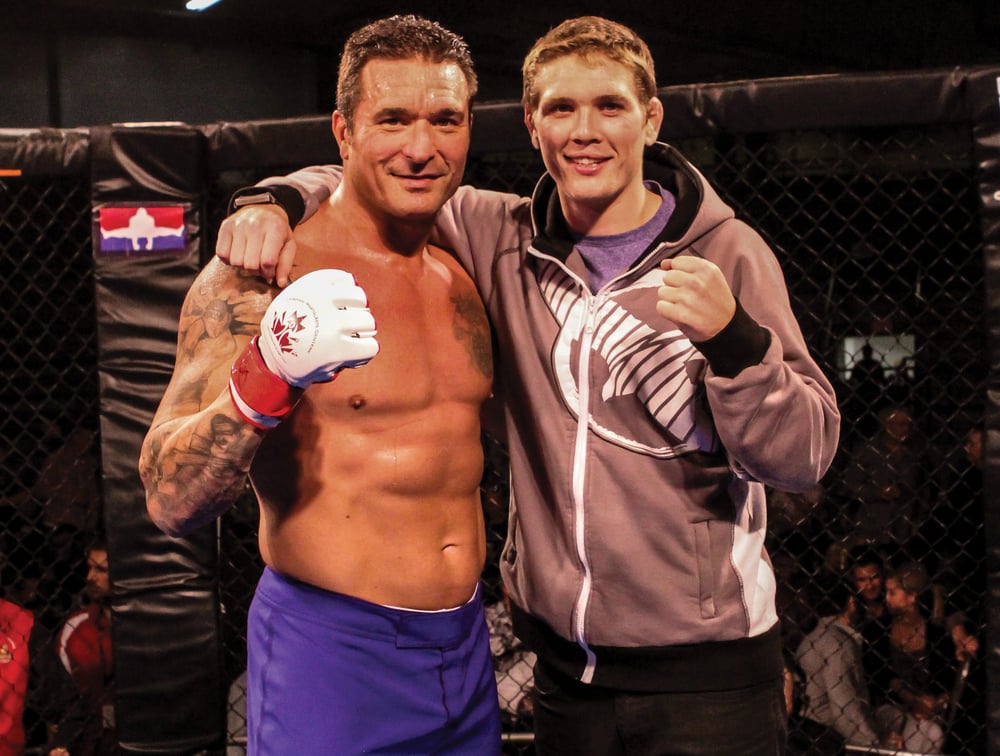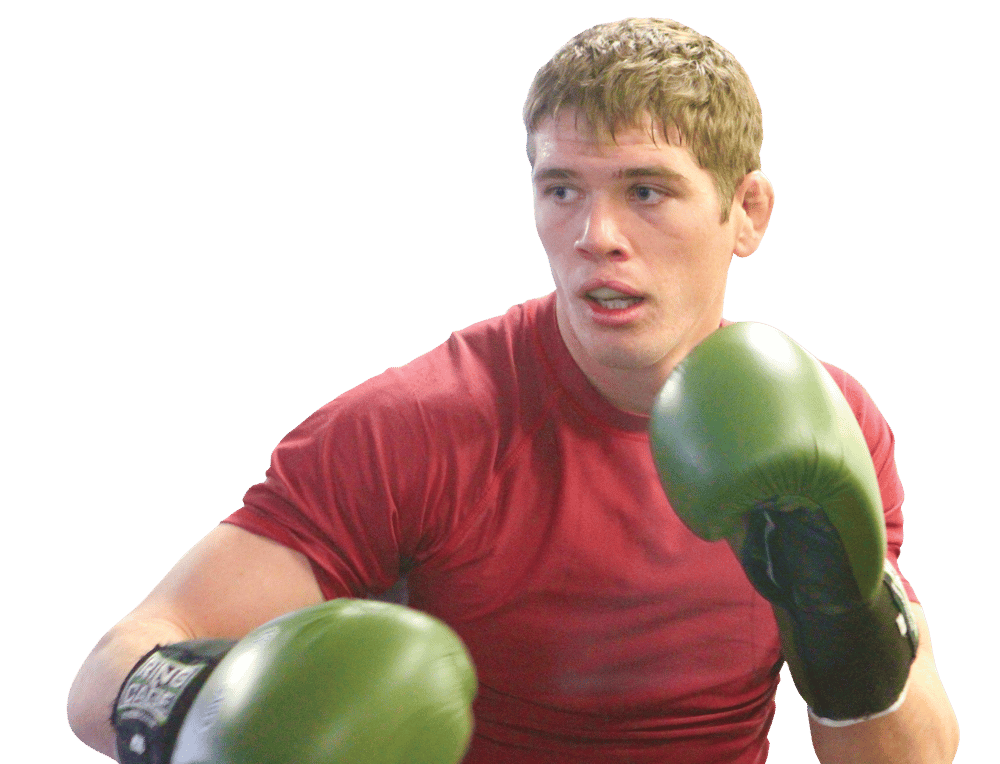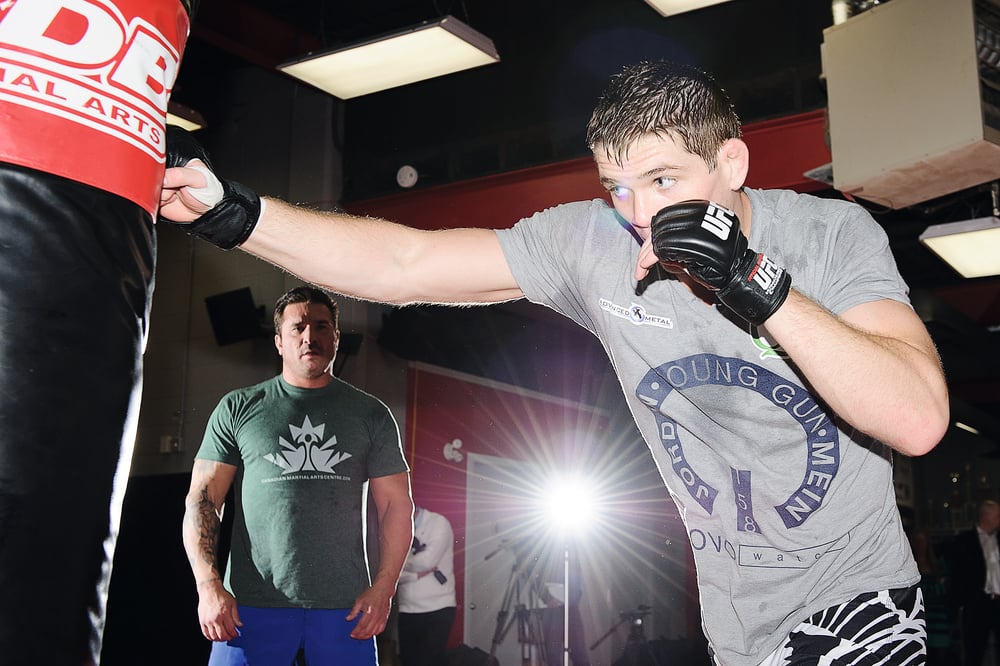
Issue 118
August 2014
Sports are littered with shattered father-son training relationships, but UFC welterweight Jordan Mein and his dad, Lee, are an exception, having gained nothing but riches from their partnership
Mention father and son in MMA, or even combat sports, and what springs to mind most often is the deep-rooted Gracie family tree.
But these relationships have a history of both glorious success and, indeed, abject failure. Some bonds are unshakeable, others riven with hatred; unfilled promise borne of one generation unable to live up to the last. Or vice-versa.
But there is a uniqueness in the case of Lee Mein and his son Jordan. They have a wonderful bond. The Canadian father-and-son from Lethbridge, two-hours south east of Calgary, have “almost grown up in the sport together,” according to dad, a large, proud man who still fights and is carrying enough injuries for a freeway pile-up.
Growing in MMA together is unusual, and so too is still fighting concurrently. Jordan is a highly talented UFC welterweight (record 28-9) with a versatile and very aggressive fighting style. Father Lee is an everyday scrapper, an old-school hard man, who’ll take local hall shows when he can get them. They both share a deep sense of ‘loving’ for fight sports.
“It doesn’t feel unusual. It feels normal to me,” explained Jordan in the aftermath of his victory over Hernani Perpetuo in Orlando (UFC on Fox 11: Werdum vs. Browne). “You see father-son relationships quite a bit in boxing. A few in MMA, too. There are a couple of examples of guys being coached by their fathers.
“I’ve been watching my dad train since I was a baby. I’ve grown up as a gym rat and I love it. That’s who I am.”

Lee is now 46. He started martial arts at 25. He has a record of 6-13. And he loves to fight. He’s been in lots of fights, worked in security, and was renowned as a man who could handle trouble, whatever it was. At the time, it was not even known as mixed martial arts, of course.
“I wanted something that worked and was real – in the worst case scenario. Six guys on one. That kind of worst scenario. That was my drive to get into kickboxing and jiu-jitsu,” he reveals.
Over the years, he’s stopped hundreds of street fights. “You just had to step in. I’ve never been stabbed, never bottled. I was always cautious. I’d never had a drop of alcohol. Even to this day. That’s why I was always sought after.”
He adds: “Jordan was a baby then. He first came to a jiu-jitsu tournament when he was three. But even as a kid, he was athletically gifted. I worried he wouldn’t work hard at it because he was so talented. He was watching Bruce Lee movies aged three, doing the splits in front of the TV. While he could dribble a basketball aged four with both hands.
“When it came to fighting I always said, ‘If you want to do it, do it, but you don’t have to.’ Like most teens, he went off and had periods playing other sports, but he’d always come back to fighting. At 10 or 11 he had his first full-contact kickboxing match.”
The tough thing growing up was finding suitable opponents, explains dad. “He’d be on the mat, rolling with adults, some aged up to 25, when Jordan was 13. I had to let him, but they were too much for him and he’d get frustrated and just quit.” But the best father-son relationships in fight sports are built on trust – and patience.
Their bond was forged tighter than ever when Jordan reached 16. “When he reached that age, I asked him if he was for real,” explains Lee. “He had the potential to do well in MMA, but I was actually talking about life, rather than a career in combat sports.
“I was just telling him that if he knew what he wanted to do, it was better to focus on it. ‘I think I want to be a full-time fighter,’ he told me. ‘Read this book,’ was my reply, as my instructor Roy Harris had said to me. I didn’t think he would. But he read the book, he did the homework and wrote out his career goals. I’d never have done that. I wasn’t doing it at 37, never mind 16.”

Jordan recalls that reading the book was a reality check. “Yes, that was definitely one of the big changing moments in my life. The book was Jack Canfield’s The Successful Principles and I remember it and loved it,” he explains.
“I followed the principles. I think reading in general just gives you a different perspective on things. That just happened to be the book that was handed to me as a teenager and I learned a lot from it.”
But with such close relationships can often come pressures, too. While Floyd Mayweather Snr may have played his part in molding Floyd Jnr into, perhaps, the greatest boxer of his generation, their relationship has been nothing less than tempestuous.
And Julio Cesar Chavez Jnr is still, some say, trying to break away from the shadow of his father, who was lionized and adored, filling the Azteca Stadium with upwards of 130,000 devotees.
While in MMA, the legendary Randy Couture fought on into his late 40s, becoming one of the sport’s first icons and a Hollywood star. Following in his huge bear prints was son Ryan, who had worked in a bank and was on his way to being a manager there. He’d dabbled in MMA, but felt he had to follow his father into the Octagon. And the pressures were enormous.
After four victories in Strikeforce, he was signed into the UFC. Two losses followed to Ross Pearson and Al Iaquinta, before he was struck off the roster. Randy had cornered Ryan in some of his fights. Common among father-son fighter partnerships.
“Cornering one another is normal to us,” explains Jordan. “I just cornered him in Edmonton. He got a groin shot from a six-foot-four opponent, while in my Matt Brown fight (UFC on Fox 7: Henderson vs. Melendez), my mouth piece came out, my face was bloodied, and he just threw it right back in and said, ‘Get back in there.’ So I’m always telling him the same, ‘Get your ass back in there,’” laughs Jordan.
They even fought on the same card once. “He won, I lost,” explains dad. “I was the main event. They wanted to see the old guy beat up.”

In other words, the father-son connection can be a lightning conductor, a rock, despite their complexities sometimes.
“It’s great having him there every day at the gym,” says Jordan of Lee. “He gives me a lot, and not just in terms of training. He gets me supplements and equipment and he’ll do whatever it takes for me to succeed. It’s something I really appreciate and respect. I’m still learning a lot from him and I always will.”
The tough time, is when flesh and blood is taking a beating, and there is little father, or son, can do about it. Nor do they want to pull each other out.
“I don’t feel my father would pull me out of a fight because I’m his flesh and blood,” says Jordan. “He knows my limit. And he knows how badly I want it. I think he’d make the right call.”
Another little-known fact about Jordan is that he had a twin, Preston, who had a type of cerebral palsy. He was 22 when he died. He was operated on for his feeding tube but there was a complication and he passed away. Part of the father-son relationship with the Meins is about treasuring what they have, and what they lost.
Lee says: “We talk about trauma in our lives, about Preston, and it brings us closer. Preston gave us the desire to help people.” And possibly each other.
“Preston taught me so much,” explains Jordan. “I always wish I could have been a better brother. But when someone’s gone you always wish you could have done things differently. He taught me a lot about being a human being and being blessed. He made me really want to make a life.
“The pain and suffering he went through his whole life puts the pain I suffered in the Matt Brown fight into perspective. Those 15 minutes of pain are nothing really.”
When Mein Snr talks of Preston it’s highly charged. He can’t help but shed a tear or two. “We loved that kid, and our bond is stronger because Preston is gone. He was a fighter, too, in every way.”
So when Lee fights, and Jordan is in the corner, he finds it tough. “I get way more nervous watching him fight than I do when fighting myself. I have control. When he fights, I don’t.”
That makes sense. Then there is the respect factor, generically, and within the family. “My dad has helped so many people in our gym (Canadian Mixed Martial Arts Gym),” explains Jordan. “That’s what martial arts brings: role models for us to look up to.
“My dad’s been that role model for a lot of people. Just talking with other athletes and people he’s helped, it’s good to see their perspective. I’m his son, he’s always been my role model, but it’s nice to know so many others see him that way, too.”

Lee says Jordan is much more talented than he could ever dream of being. Jordan says he does not know a tougher man. “Of course he could whoop my ass. He’s 250lb of muscle. I’d be in big trouble if we had to fight,” laughs Jordan, glancing at his father.
Unlike some father-son concerns, Jordan does not contemplate his father giving up the sport. “He’ll know when it’s time to stop and it will be his choice. Whatever he decides to do, I’ll support him on it.
“A lot of family members have told him he should stop fighting, but I don’t agree. I’m happy for him to keep doing what he wants to do. Bernard Hopkins is still boxing at 49, and is a double world champion right now. He’s still one of the best in the world. He’ll be fighting when he’s 50. Everybody’s different.”
It is a delight to both men that Lee was still fighting when Jordan began. “I’m fortunate he’s doing something I love, we get to be at the gym together,” admits the old man.
A lot of parents live through their children. Lee is living with Jordan, sharing sweat, blood and tears. Surely a much healthier way to encourage your offspring? “I get what the point is in all this. You’re always making mistakes,” says Lee.
“Whatever your goal, plumber, doctor, fighter, you’ll make mistakes. I did, he will. The bottom line is that we accept being accountable for those mistakes. I’m his father, coach, and manager. I make him accountable as I do with all the other fighters I have. I have to.”
But one day, when they are ready, the fighting will cease. “Look, we both like golf, we play together sometimes, and that will grow as we get older together. Our golf’s not pleasant to watch, believe me,” says Lee self-effacingly. “But we’ll play together for many years.”
Perhaps some father-son bonds are just destined, whatever the stage.
...









